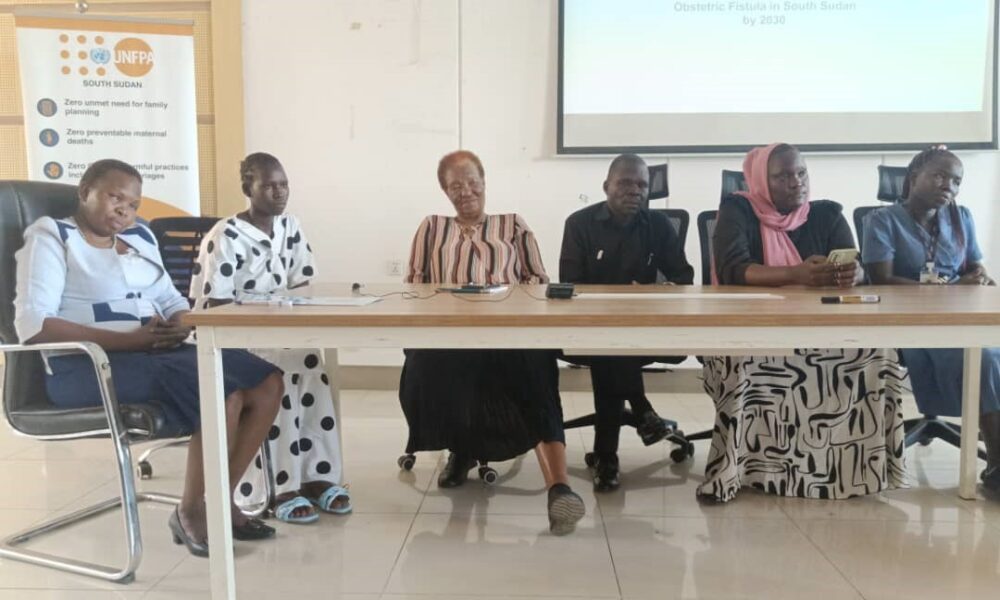By Kei Emmanuel Duku
Juba Teaching Hospital’s fight against obstetric fistula is severely hampered by an inadequate number of medical surgeons, according to health experts at the facility.
An estimated 60,000 women in South Sudan live with obstetric fistula, yet fewer than 1,000 of them have received necessary surgical repairs and treatment.
Obstetric fistula is an abnormal opening between a woman’s genital tract and her urinary tract or rectum.
Dr. Mustafa Haram, an Obstetrician at Juba Teaching Hospital, highlighted that only two operating theatres are currently available at the hospital.
This limited capacity, coupled with a high number of patients seeking health services, hinders timely responses.
He noted that these two operational theatres are staffed by fewer than five surgeons performing operations on women requiring fistula repair.
“When we have a camp for fistula, even if we dedicate a room, emergencies often arise with large numbers of patients. This makes management a problem, and sometimes we end up postponing scheduled fistula surgeries,” Dr. Haram explained.
Dr. Haram stressed the critical need for a dedicated Obstetric Fistula Centre in Juba to manage the increasing number of patients arriving from various states.
He added that the current facility at Juba Teaching Hospital used for fistula patients also serves other medical needs.
Obstetric fistula is largely preventable, Dr. Haram stated. It can be avoided by delaying the age of first pregnancy, ending harmful traditional practices, and ensuring timely access to obstetric care.
He appealed for the establishment of fistula centers across various states, emphasizing the critical role of preventive measures like family planning to reduce unwanted pregnancies.
Additionally, he highlighted the importance of building the capacity of medical doctors and specialized fistula surgeons, alongside training health mobilizers to identify and screen patients suffering from the condition, as crucial steps in combating the surge.
To achieve the 2030 goal of ending fistula, South Sudan urgently needs trained specialized surgeons fully equipped with necessary medical tools, according to Dr. Anthony Lupai, Director General at Juba Teaching Hospital.
Dr. Lupai stressed the need to support the Juba Teaching Hospital’s Antenatal Care Services department.
This support would ensure women seeking maternal services receive timely sexual and reproductive health education, thereby helping to reduce fistula cases.
Women experiencing fistula suffer constant urinary incontinence, often leading to social isolation, skin infections, kidney disorders, and even death if left untreated.
Globally, an estimated over 2 million young women in less developed countries live with untreated obstetric fistula, with approximately 50,000 to 100,000 new cases developing worldwide each year.
Dr. Lupai explained that most fistulas occur in cultures where a woman’s status is heavily tied to marriage and childbearing.
Factors like rape or early forced marriage can lead to young pregnancies, a significant risk factor.
He noted that girls who experience rape often conceal their pregnancies from parents, leading to delayed access to sexual and reproductive health education and subsequently, childbirth complications for these young girls.
“Most of the time, when you have a dead baby delivered after obstetric labor, the damage is going to be immense because time has been taken, and the tissues around the uterus are deprived of an adequate oxygen supply after death of the unborn baby,” explained Dr. Lupai.
Patients with uncomplicated fistulae can undergo a simple surgery to repair the hole in their bladder or rectum. About 80-95% of vaginal fistula can be closed surgically.
However, Dr. Lupai stated that patients with fistula in South Sudan often face severe stigmatization. He highlighted that many of these girls are victims of forced marriage or rape, sometimes leading to abandonment by relatives and spouses.
He appealed for family support, emphasizing, “If your daughter is raped or married young, support her. Two wrongs do not make a right. These girls do not want the pregnancy, so to avoid fistula cases, we are doing routine surgery here at the hospital.”
Obstetric fistula, a condition largely caused by complications during childbirth, contributes to up to 8 percent of maternal deaths worldwide. Dr. Rev. Janet Michael, Director General for Midwives and Nurses at the National Ministry of Health, identified unskilled delivery, child marriage, and forced marriage as common causes in South Sudan.
She noted that once a woman develops a fistula, it profoundly affects her physically and socially, impacting her family and her ability to contribute to society.
Dr. Michael stated that obstetric fistula is one of the contributors to high maternal mortality and morbidity in the country. She appealed to policymakers to design laws that prohibit or minimize child and forced marriages.
“What we have not seen is the misery our sisters and daughters are living through, emotionally, psychologically, and the economic burden they have placed on their families, added to the isolation and discrimination they are subjected to. These calls on our traditional chiefs, policymakers, and other influential leaders need to take action now to end fistula, if South Sudan is to achieve Agenda 2030,” said Dr. Michael.
She further appealed to pregnant mothers to attend antenatal care services regularly, regardless of how they conceived, to prevent fistula cases.
“Getting pregnant and having a baby should not end up like having a punishment by getting a fistula; it should be a joy for every woman to have a baby, and that joy is celebrated in every community,” concluded Dr. Michael.
Obstetric fistula still exists because healthcare systems fail to provide accessible, quality maternal health care, including family planning, skilled care at birth, basic and comprehensive emergency obstetric care, and affordable treatment of fistula.




